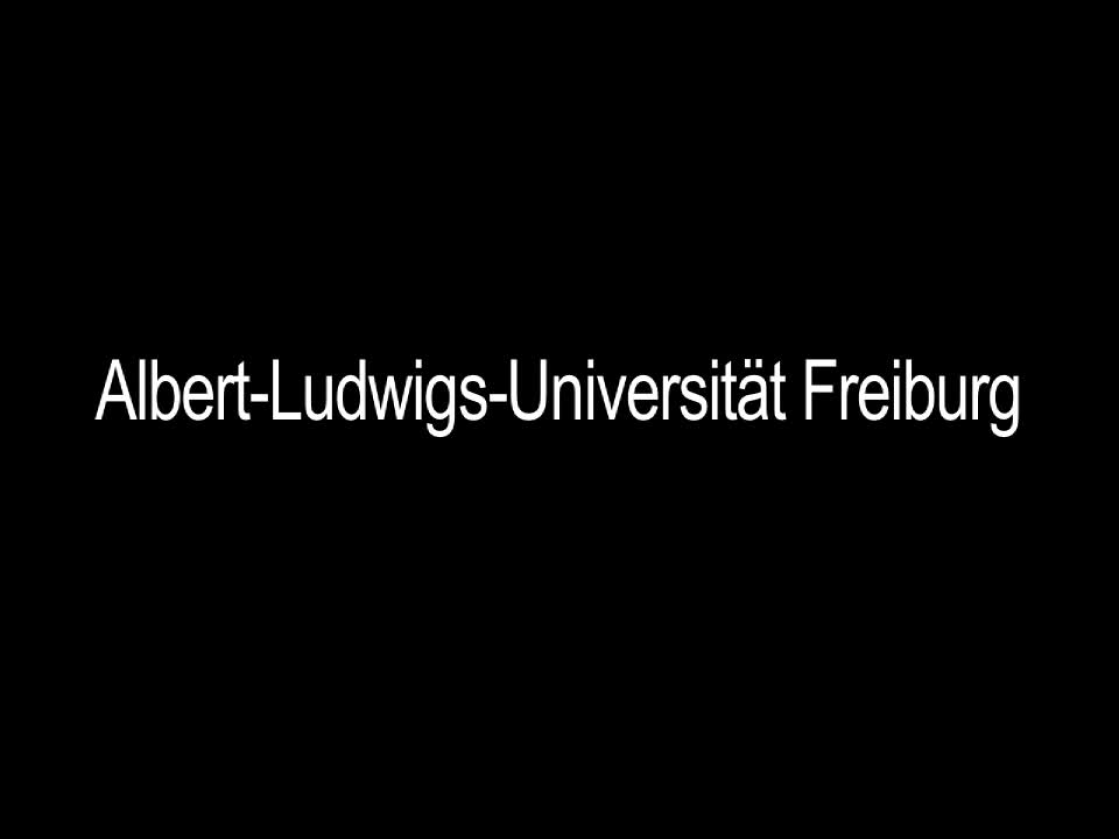Kategorien
- ACT - Africa Centre for Transregional Research
- Chemie
- Digitales Lehren und Lernen
- FMF - Freiburger Materialforschungszentrum
- Geographie
- Geowissenschaften
-
Geschichte, Gesellschaft, Politik
- Gender Studies
- Gesellschaft
- Osteuropakanal
- Ringvorlesung - Geschichte, Gesellschaft, Politik
- Islamwissenschaft
- Politikwissenschaft
- Soziologie
-
Geschichte
- Geschichte der Astronomie
- Ostmitteleuropa zwischen den Weltkriegen, 1918-1939
- Die Donaumonarchie Österreich-Ungarn
- Das Zeitalter der Entdeckungen
- Reformation und Gegenreformation in Ostmitteleuropa
- Polen im 20. Jahrhundert
- Das geteilte Polen, 1795 - 1918
- Das Osmanische Reich und Europa
- Osteuropa im Mittelalter
- Der Erste Weltkrieg in Osteuropa
- Mittelalter- und Renaissanceforschung
- Hochschuldidaktik
- Innovationscampus Nachhaltigkeit (ICN)
- Kultur
- Medienkulturwissenschaft
- Pharmazie
-
Philosophie, Sprache, Literatur
-
Philosophie
- Frei sein, frei handeln - Freiheit zwischen theoretischer und praktischer Philosophie
- Theorien der Wahrheit, WS 2008/09
- Beweistheorien, SoSe 2009
- Was ist Philosophie? SoSe 2010
- Kontroversen in der Philosophie, WS 2010/11
- Logik und Metaphysik, SoSe 2011
- Voraussetzung und Vorurteil, WS 2011/12
- Paradigmenwechsel in der Philosophie? SoSe 2012
- Antike und mittelalterliche Philosophie. WS 12/13
- Nietzsche als Philosoph der Moderne
- Heidegger in der Moderne
- Heideggers „Schwarze Hefte“ im Kontext
- Husserl-Archiv
- Frankreich-Zentrum
- Sprache und Literatur
- Universitätsbibliothek
-
Philosophie
- Psychologie
- School of Education FACE
- Sport
-
- Samstags-Uni: Dimension ‚Zeit‘: Temporalität in Wissenschaft, Kunst, Kultur und Gesellschaft
- Grüne Gentechnik – Chancen für Nachhaltigkeit?
- Colloquium politicum
-
Die Samstags-Uni
- Samstags-Uni: Demokratie – Grundlagen und Herausforderungen
- Samstags-Uni: In vino veritas? Wein – Kultur – Wissen
- Samstags-Uni – Der Klimawandel
- Blicke auf Europa
- Bildung – heute
- Die digitale Revolution
- 70 Jahre Grundgesetz: Von der Verfassung unseres Gemeinwesens
- Der Dreißigjährige Krieg: Interdisziplinäre Perspektiven
- 500 Jahre Reformation: Luther und die Folgen (2017/18)
- Einführung in den Islam (2017)
- Nationalsozialismus in Freiburg (2016/17)
- Erinnerungsorte des Mittelalters am Oberrhein (2016)
- Der Isenheimer Altar – Werk und Wirkung (2015/16)
- Zwischenkriegszeit: Vom Kaiserreich zur Weimarer Republik (2015)
- Der Erste Weltkrieg im Spiegel der Künste (2014/15)
- Freiburg 2025: In welcher Stadt wollen wir leben? (2014)
- Das Freiburger Münster (2013/14)
- Neue Wege in der Medizin (2013)
- Religion – Wozu? Religion und Religionen in moderner Gesellschaft (2012/13)
- Freiheit und Sicherheit in der offenen Gesellschaft (2012)
- Alt und Jung (2011/12)
- Im "Internationalen Jahr der Wälder" 2011 zum Thema "Wald"
- Mythos in Antike und Gegenwart (2010/11)
- Samstags-Uni: „Resilienz“: Widerstandskräfte in Krisenzeiten
- Recht und sozio-ökonomische Wirlichkeit (2009)
- Zum Verhältnis von Kunst und Wirklichkeit (2008)
- Zur Geschichte der Freiburger Universität (2007)
-
Vortragsreihen Studium generale
- Zwei Leitfiguren der Moderne - Immanuel Kant (*1724) und Franz Kafka (†1924)
- 175 Jahre Deutschlandlied
- Bioethik und die Dynamik der Natur
- Ethik in der Medizin
- Der Erste Weltkrieg am Oberrhein
- Freiburger Sommervorträge
- Freiburger Wintervorträge
- Grenzen der Ökonomisierung?
- Herausforderung „Corona“: Perspektiven der Wissenschaft
- Heinrich Böll 100
- Mittelalterbilder in der Moderne
- Navigare necesse est. Reiseliteratur von der Antike bis zur Gegenwart
- Neurowissenschaftliche Forschung – Wo stehen wir?
- Perspektiven der Hermeneutik
- Nietzsches Literaturen
- Welt-Sichten: Verständigungen über Kultur
- Neues aus der Kultur – und ihren Wissenschaften
- Einzelvorträge Studium generale
- Symposien - Studium generale
- Lange Nacht der Universität
- uniCROSS













